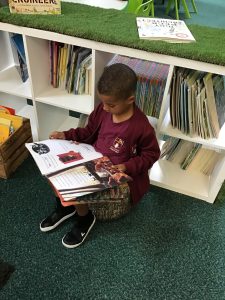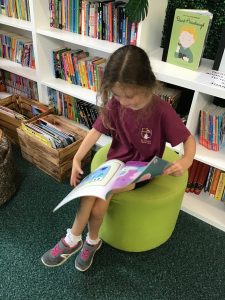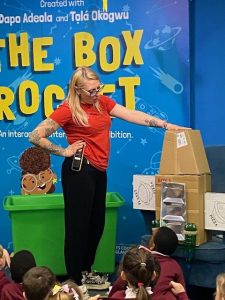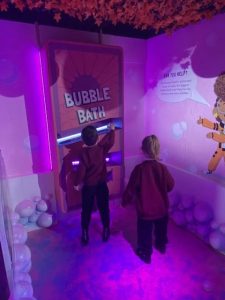
Phonics
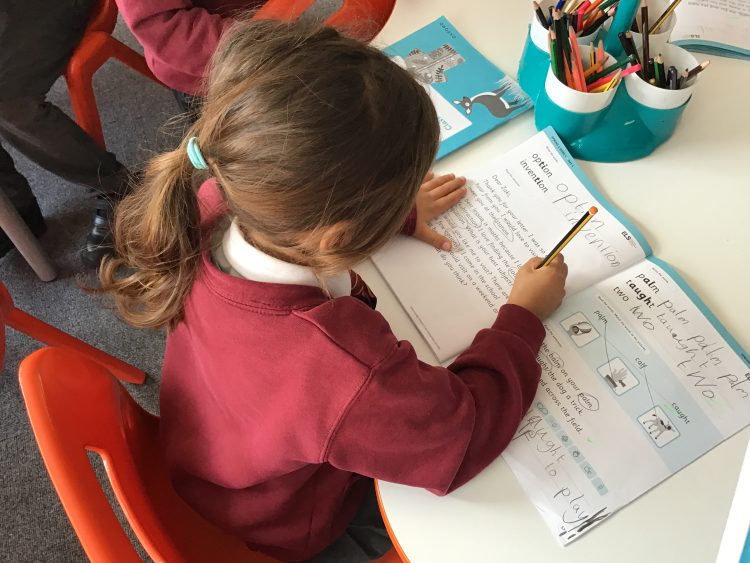
Proverbs 22:6
Giving children the ability to decode the sounds of letters or groups of letters.
Organisation of Phonics
Essential Letters and Sounds (ELS) is our chosen Phonics programme. The aim of ELS is ‘Getting all children to read well, quickly’. It teaches children to read by identifying the phonemes (the smallest unit of sound) and graphemes (the written version of the sound) within words and using these to read words.
Children begin learning Phonics in Nursery where they develop their speaking and listening skills and auditory discrimination. In Reception Phonics is explicitly taught every day during a dedicated slot on the timetable. Children are given the knowledge and the skills to then apply this independently.
Throughout the day, children will use their growing Phonics knowledge to support them in other areas of the curriculum and will have many opportunities to practise their reading. This includes reading 1:1 with a member of staff, with a partner during paired reading and as a class.
Children continue daily Phonics lessons in Year 1 and further through the school, where necessary, to ensure all children become confident, fluent readers.
We follow the ELS progression and sequence. This allows our children to practise their existing phonic knowledge whilst building their understanding of the ‘code’ of our language GPCs (Grapheme Phoneme Correspondence). As a result, our children can tackle any unfamiliar words that they might discover.
Children experience the joy of books and language whilst rapidly acquiring the skills they need to become fluent independent readers and writers. ELS also teaches relevant, useful and ambitious vocabulary to support each child’s journey to becoming fluent and independent readers.
We begin by teaching the single letter sounds e.g. s as in sad before moving to diagraphs ‘sh’ (two letters spelling one sound), trigraphs ‘igh’ (three letters spelling one sound) and quadgraphs ‘eigh’ (four letters spelling one sound).
We teach children to:
- Decode (read) by identifying each sound within a word and blending them together to read fluently
- Encode (write) by segmenting each sound to write words accurately.
The structure of ELS lessons allows children to know what is coming next, what they need to do, and how to achieve success. This makes it easier for children to learn the GPCs we are teaching (the alphabetic code) and how to apply this when reading.
ELS is designed on the principle that children should ‘keep up’ rather than ‘catch up’. First wave interventions are delivered within the lesson by the teacher, any child who is struggling with the new knowledge can be immediately targeted with appropriate support. Where further support is required, 1:1 or small group interventions are used where needed. These interventions are short, specific and effective.
Children take home ‘banded’ books which are phonetically decodable and closely matched to the child’s phonics knowledge by their class teacher. This is in order to practice and consolidate their reading at home. Books are changed once or twice a week at the early stages in order for children to re-read texts building their orthographic map (memory of words by sight) as well as improving their fluency and expression.
Further information about ELS can be found here.
Click here for a video showing you 'How to pronounce pure sounds.'
English Lessons – Phonics
Nursery
Phase 1 phonics skills that are developed at this stage include:
- Environmental sounds
- Instrumental sounds
- Body percussion (e.g. clapping and stamping)
- Rhythm and rhyme
- Alliteration
- Voice sounds
- Oral blending and segmenting (e.g. hearing that d-o-g makes ‘dog’)
Reception
Phases 2-5:
Children are taught Grapheme Phoneme Correspondence- that a letter or groups of letters make sounds in words. Children begin with the single letter sounds e.g. s as in sad before moving to diagraphs ‘sh’ (two letters spelling one sound) e.g. shut, trigraphs ‘igh’ (three letters spelling one sound) e.g. light and quadgraphs ‘eigh’ (four letters spelling one sound) e.g. eight. Children are taught the key skills of segmenting (breaking a word into each unit of sound) and blending (putting the sounds back together to read the word). Revision weeks are built in throughout the year to allow children time to revisit and consolidate their sound recognition and the key skills of segmenting and blending.
Reception Parents' Meeting Sept 2025
Year 1
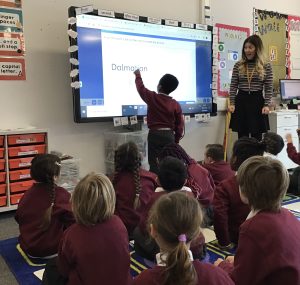 Phase 5 continued and alternative spellings/pronunciations:
Phase 5 continued and alternative spellings/pronunciations:
Children begin by revising previously taught Phase 5 GPCs from the Summer term of Reception before being taught a set of new GPCS. They then move on to alternative pronunciations (previously taught GPCs which can be pronounced in more than one way e.g. ou is pronounced differently in soup compared to cloud) and alternative spellings (a sound which can be spelt in different e.g. the f sound can be spelt with a f or ph e.g. fox, elephant.
Through Reception and Year 1 children are taught a series of ‘Harder to Read and Spell words’ (HRSWs) which cannot be phonetically decoded. These words are taught by sight and children practice reading and spelling them every day.
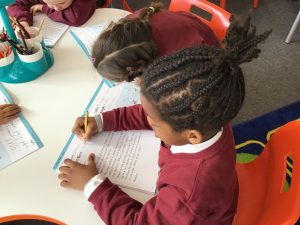 Year 2
Year 2
Phase 6:
Children continue to develop these three main skills-
- reading words automatically if they are very familiar;
- decoding them quickly and silently because their sounding and blending routine is
now well established; - decoding them aloud when meeting a new or unfamiliar word.
The goal is for children to also become confident spellers. During this phase, children will start to spell more complex words. They will continue to work on spellings and skills which are more difficult, for example:
- using suffixes to indicate tenses
- the rules for adding -ing, -ed, -er, -est, -ful, -ly and -y
- plural spelling
- using prefixes to change words
Enrichment - Phonics
Reading for pleasure is encouraged from the very beginning of the children’s school journey! Stories are read aloud daily throughout EYFS and KS1 during story time with connections to the current curriculum where possible.
Each class visits either the school’s ‘Rainforest Reading Room’ or the public library situated opposite the school on a fortnightly basis in order to read stories together and bring a selection of books chosen by the children back to school to be read in the classroom!
Each year we participate in a number of workshops or author visits arranged to celebrate various national or international events sometimes even dressing up in our PJs with our favourite bed time story or as book characters e.g. ‘National Story Telling Week,’ ‘World Book day,’ and ‘Poetry day.’
|
|
|
This year, our Reception children had the exciting opportunity to visit the Discover children’s Story Centre in Stratford where they had a great time taking part in workshops to support their language skills and imagination.
|
|
|

